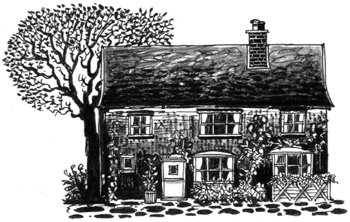

“I’ve got a very busy day, I’m afraid,” said Jack’s granny at breakfast the following morning. “And I expect you do too?”
She looked at Jack with beady eyes. She always made him feel that she could see right through him. Her gray hair was cut short and her beaky nose and blinking eyes made Jack think of a smart bird. She had provided a hearty breakfast of oatmeal and a boiled egg and toast. Now she was expecting an answer.
“I’ve got a lot to do,” Jack told her loudly.
“Good,” boomed Granny.
Jack chewed his toast. I had a couple of highwaymen in my bedroom last night. They popped through from the eighteenth century. He practiced saying it in his head. He could say it now. Obviously Granny wouldn’t believe him. And then he could take her up and show her … what? The mess?
“You know how to reach me,” said Granny. My cell phone number is by the phone. I’ll be back for lunch. If you get hungry—help yourself. There’s ham and quiche in the fridge.”
Jack opened his mouth as if to say something, then closed it. Sometimes busy grown-ups miss the most exciting things.
Back in his room, Jack looked at the mess. There were black footprints on the wallpaper, and the candle had made a waxy splotch on the bed. The chair was broken and the curtains were ripped off their hooks. Oh, dear. What would Granny say?
Then he saw the bag that the highwaymen had left, lying by the old chest. In all the excitement, he had missed it. He opened the drawstring and looked inside. There were silver knives and a silver jug, a bag of coins, and some rings and a necklace. Wow! Treasure! Real treasure.
He reexamined the wall. First thing in the morning he had tried again to open it. He had picked at the wallpaper and found a sheet of rusty metal with hinges at the bottom. He had pushed it, but it wouldn’t move. He wondered—had it always been here—only just now discovered?
Looking again, he thought he could see a sliver of light at the side. He found a metal coat hanger and began working the hook along the top edge, sawing in and out as the knife had done the previous night. Suddenly the door fell open. “Yes!” Jack clenched his fist in triumph. Then, blinking through a small cloud of dust and plaster, he peered through.
The metal door had fallen to the side of a fireplace on the other side of the wall. As the dust settled, he could see into the room beyond. It was a room he had never seen before.
Smaller than the room in Granny’s house, it was darker and dirtier. Jack could see a rough, unmade bed and a wooden chair with clothes on it. He felt fluttering butterflies in his stomach. Could he really be on the brink of the eighteenth century?
Then the smell hit him. Wood smoke and pigs! It stuck in his throat and made his eyes water. Still, he took a deep breath and crawled through. The whole world changed. The house was suddenly utterly silent, as if the low buzzing of modern life had been wiped clean away. Here was a deep country silence, without electronics or machines or passing aircraft.
He found the room basic and bare. There was a small window low down on his left. On his right, there was a candle on the floor with a cascade of drips around it. A black coat hung on a hook by the narrow door. It felt like a different house.
Gradually he became aware of sounds. He heard a crowing far off, a squawking of birds, a grunting and snuffling of pigs. It was as if he was in a farmyard. A voice outside startled him. The accent was so broad and unfamiliar that he couldn’t make out what was being said. It sounded like: “Saaaf. In the faaarrrmy.”
He peeped out of the dirty little window.
“Oh, wicked!” he breathed. The view from his bedroom window, of the little market square with trees and benches and a clean black road running around neat little houses and shops, was completely transformed. There was mud everywhere. The houses were small and dirty. Ducks and hens roamed freely; a horse and cart stood waiting.
But there was the pub! The Cap and Stockings! It was immediately recognizable with its row of three dormer windows and the jutting-out window by the door. It was dirtier and poorer and had ivy growing up one side, but it was unmistakably the same building.
A man appeared at the far end of the square. He was wearing a smock and rough peasant clothes. Jack watched him put a wooden box on the cart, then he disappeared around the corner of a building. An everyday scene of the eighteenth century—just a man loading a cart.
Jack crept to the door of the room, past the unmade bed and a leather bag stuffed with clothes that spilled out onto the floor. He saw the arm of a man’s shirt trailing across the floorboards, and he caught a glimpse of a gold button nestled in dark folds of velvet. He couldn’t help feeling he was in an entirely different house but had to remind himself that he wasn’t. This was still Granny’s house! So he wasn’t doing anything wrong, was he?
He opened the small door and found a narrow staircase. There was no staircase here in Granny’s house. But it must lead down to the kitchen. Jack listened. Nothing. The first steps creaked dreadfully. As he expected, there was the kitchen, smaller and darker than Granny’s. Looking through the simple oak banister, he could see a table and two chairs and the big fireplace with a fire slumbering and pots and pans stacked nearby.
Jack stepped off the last stair. And something hit him.